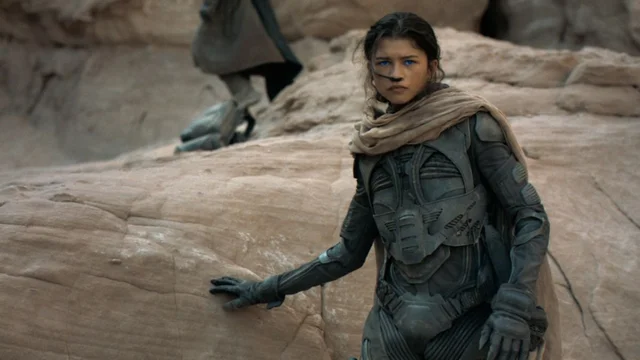Caroline Richards ’22
Arts Editor
For anyone who’s read Frank Herbert’s Dune, you’ll know that there’s not a lot of direct action. It’s what makes the book so difficult to read; a lot of the world-building is based on telling (or not telling at all) rather than showing, and the majority of the action that takes place takes place off-page and is only known through character dialogue.
In sum, there’s a lot of talking about action. That’s why I was surprised by Denis Villenueve’s take on the Dune in his new, and highly anticipated, movie: there’s hardly any dialogue. I’m pretty sure Zendaya has like eight lines and Timothee Chalamet, who plays the central figure Paul, is really built off what he doesn’t say. And where Herbert wastes no time thrusting the reader into a deeply complex world with little to no exposition or explanation, Villeneuve seems to completely eschew the potential for a confused audience.
In fact, what little dialogue there is is used largely to explain the context of the images we’re being shown. For this set-up to work, Villeneuve needed to create a rich, textured aesthetic; what drama and tension he lacked in dialogue needed to be made up for in a dramatic, magnetic, mesmerizing world. And for the 165 million dollars he had in his budget, he had the means to do this incredibly well. Unfortunately what we got is a world that’s minimal to a point boring, and dull to the point of lacking creativity.
I’ll admit that the grandeur and scale of the world he creates is impressive and thoroughly done, the open spaces and sheer largeness of his shots are certainly immersive. But they’re also flat and empty to a point where it detracts from the smallness and intimacy needed to get to know the characters within them; not only are we given so little time to get to know the characters, but it seems every time we meet them all we can focus on is their smallness within this huge, inevitably boring, minimal shot. Understandably, Arrakis, the primary setting, is a desert. Deserts are pretty barren and minimal.
But this isn’t an excuse to make nearly the entire movie barren and minimal. If anything, you need something else entirely to contrast the qualities of the desert to make it’s barrenness as harrowing and mysterious as possible. The last thing you want to do is make everything from the cityscapes, to the interior shots, to the costumes, to the make-up all look exactly the same: grey, brown, and generally muted. For 165 mill that’s pretty unoriginal. The best part of the movie was the worms, which for the staggering grandeur of Villeneuve’s desert portrayals, are the only things that seem to fit in. Maybe this was on purpose.





Greg Zuschlag: This opinion rings false to me on two counts for me:
(1) It reflects no understanding and appreciation of Villenueve’s distinctive cinematic aesthetic and film style. The more interesting question would be is how Dune fits or does not fir with Villeneuve’s corpus (e.g. Sicario, Arrival, Prisoners, Blade Runner 2039) in terms it’s directorial aesthetics and cinematography. Villenueve respects the viewer in demanding more from him/her in his shot selection, composition, and editing choices, than the average Hollywood hack and that is what makes his films categorically superior to the run of the mill fare, e.g. MCU films (let us pray that the studio has not tied Zhao’s beautiful hands) and James Bond films (no disrespect to Mendes and Fukanaga). I would say that Dune is a rather “water-downed” version of Villeneuve’s aesthetic (esp. when compare to Blade Runner 2039), which I think was a studio driven commercial driven conservative decision. I believe that b/c WB has held back from “greenlighting” part II until after the box office returns. For the love of Arrakis, with a true cinematic artist like Villeneuve to be treated that way shows that crass commercialism trumps art in todays cinema.
(2) Ms. Richards needs to think more deeply about the thorny question regarding a cinematic adaptation of a literary work. How faithful or unfaithful does a director need to be to the source material to make a great film? Can one really “faithfully” “adapt” a piece of writing into a film without compromise the cinematic medium? Kubrick is the test case for this how he “adapted” his “source material,” esp. in The Shining or even 2001: though both films were “hated” by their respective authors and their fans for not being “faithful,” in Kubrick’s hands the film “versions” are much better than than the written work. Villeneuve possesses the same level of cinematic mastery as Kubrick and even easier/kinder to the viewer than Kubrick. I actually think Villeneuve is too faithful to Herbert, who frankly, can’t write very well–both technically and narratively–, despite his world building genius.
Joe: Artistic dribble! This movie was a bore, Villeneuve is ideologue and a poor story teller. Hollywood’s entire purpose is to tell a good story be it visually or orally! The books do take some concentration to read. This movie was hard to watch as Paul is a more active male character in the books but this version is a pansy philosopher twit. The lynch version at least got you involved emotionally with the lead characters and had you rooting for Paul and the Fremmon by the end of the movie. The only reason this movie grossed what it did was because so many kids are bored and needed to go see any movie and had limited options!
ArcadeAlcehmist: first 3 mins,
WE WAZ OPRRESSED N SHEEET
Steve: Thank you for this review focusing on the aesthetics of the film. I think it’s right on target. Having read the book “Dune” 5 times over the years, I never once felt that minimalism was appropriate to the world depicted in its pages. I expect more than just a change in the weather to tell me I’m in another planet (i.e. this giant concrete parking lot is baking in the hot sun, this other giant concrete parking lot is cloudy with some rain). It all quickly became very boring.
ArcadeAlcehmist: don’t care about The directors Obvious attempt to hijack narrative and seed ideology that dose not belong in the franchise.
SY-FY did a faithful adaptation as a Screenplay based on the book much word for word. Lynch couldn’t do this very well with the budget cost of practical effects.
Villeneuve makes ARTISTIC visuals for the movie look amazing but that’s all he did, was set the movie’s appearance, but the ACTORS he chose where boring and the spoken lines where cringe, it felt like watching a Childs stage play with a massive CGI budget, the spoken lines where SLOW drawn out boring waste of screen time, some parts made NO sense, i mean no one even suspected Jessica as the betrayer because they constantly just saw the Barron as the threat which never was the intention of the book, the psychological aspect was MISSING. also using Misinterpretations of descriptions such as the spice being “hallucngenic” it never was described as that it was described as Prolonging life and expanding consciousness. to Dull it down to Tripping balls and living longer really pissed me off.
also referring to PAUL as PAUL instead of Usul which would be the name used by the fremen. Then we have the Bollox Throat singing world no description of the betrayal by Piter actually that was MISSING, the banquet was also missing so no intimidation or smuggler also why we talking in Huttneese is this star wars?
Villeneuve said he wants to be FAITHFUL but doesn’t even understand the book with his CHILD LIKE BRAIN.